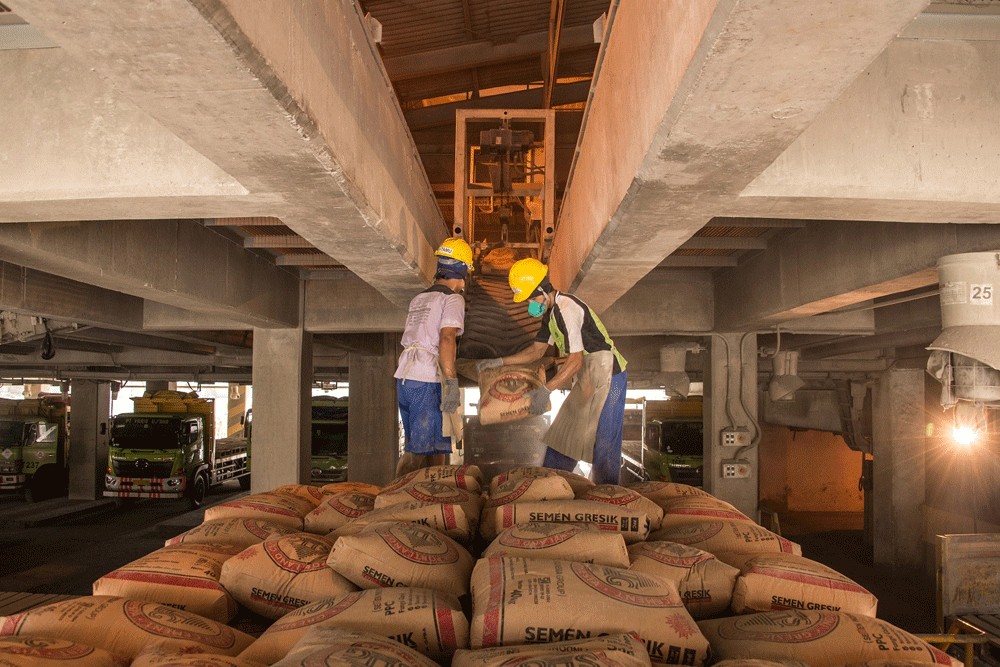Popular Reads
Top Results
Can't find what you're looking for?
View all search resultsPopular Reads
Top Results
Can't find what you're looking for?
View all search resultsSemen Indonesia expects double-digit contraction in cement demand this year
Change text size
Gift Premium Articles
to Anyone
State-owned cement producer PT Semen Indonesia expects domestic cement demand to contract by 13 to 15 percent this year.
The company’s marketing and supply chain director, Adi Munandir, said on Wednesday that the projection was based on the delay in private construction projects and the government’s infrastructure development as a result of the COVID-19 crisis.
“This has caused cement demand to contract by 8.8 percent in July, and we expect this slump will continue until the end of the year,” he said during a virtual press briefing.
Indonesia Cement Association (ASI) data show that nationwide cement demand fell to 12.52 million tons in the period of April to June, down from 13.75 million tons in the same period last year.
Cement sales in the first half of the year have dipped 7.72 percent year-on-year (yoy) nationwide to 27.1 million tons, according to the association’s data.
Despite the slowdown, Adi said, the company was looking to tap into other opportunities to boost sales, including the retail housing market.
“We see an uptick in cement bag sales during the first half of this year as home renovation is on the rise during this pandemic,” he said.
ASI data also show that sales of cement bags, commonly used by retail customers, accounted for 76.4 percent of the total cement sold during the first half of the year.
Adi also said that Semen Indonesia would maximize the use of its production facilities in Indonesia and abroad to meet the demand.
“We are focusing on integrating our business with PT Solusi Bangun Indonesia and unlocking our full potential,” he said.
Semen Indonesia acquired 6.18 billion shares in publicly listed Solusi Bangun, previously Holcim Indonesia, from Dutch cement maker Holderfin BV in 2019.
As for the company’s financial performance this year, the firm’s finance director Dody Diniawan said it would all depend on cement sales during the second half.
“If sales in the second half are flat, we expect that our performance in the first half would continue until the end of this year,” he said.
Semen Indonesia’s profit grew by 26.34 percent yoy to Rp 612.47 billion (US$42 million) in the first half of the year despite revenue contracting 1.9 percent yoy to Rp 16.03 trillion.
Mirae Asset Sekuritas analyst Mimi Halimin wrote in a research note dated Aug. 10 that the worst time for the company had passed.
“We believe that the weak performance in the second quarter will be the worst performance for this year, and we still expect a recovery in the third and fourth quarters of this year,” she said in her research note.
She said the large-scale social restrictions (PSBB) the government implemented from April to June to curb the spread of the coronavirus had been suppressing cement demand.
She projected that the company’s revenue would reach Rp 38.6 trillion and profit Rp 2.6 trillion this year, thanks to extensive efficiency efforts.
In 2019, the company had booked Rp 40.3 trillion in revenue and Rp 2.39 trillion in profit.
The analyst’s statement was echoed by Semen Indonesia senior vice president group head of finance Andriano Hosny Panangian, who stated that the company would ensure that its raw material and operational costs remain efficient during this pandemic. In the first half, it has pushed down the cost of revenue by 4.1 percent yoy.
It would also continue to aggressively lower its debt, so that it could lower its financing cost and achieve profit growth this year, he said.
As of June, Semen Indonesia recorded a 24.7 percent decline in short-term debt of Rp 910.92 billion compared to the end of 2019. Its long-term bank loans also declined by 4.9 percent to Rp 16.78 trillion in the same period.
The company’s aggressive repayment efforts since 2019 resulted in a fall in financing cost by 20 percent yoy to Rp 1.2 trillion.
“We would also use our capital expenditure [capex] for essential purposes only to ensure all-round efficiency,” Andriano said, adding that the company had used Rp 600 billion of its Rp 1 trillion capex allocation as of June.
Semen Indonesia’s shares, listed on Indonesia Stock Exchange (IDX) under the ticker code SMGR, have lost 11.9 percent since the beginning of the year. On Friday at 1:09 p.m., their were trading down 0.94 percent at Rp 10,575 apiece.










